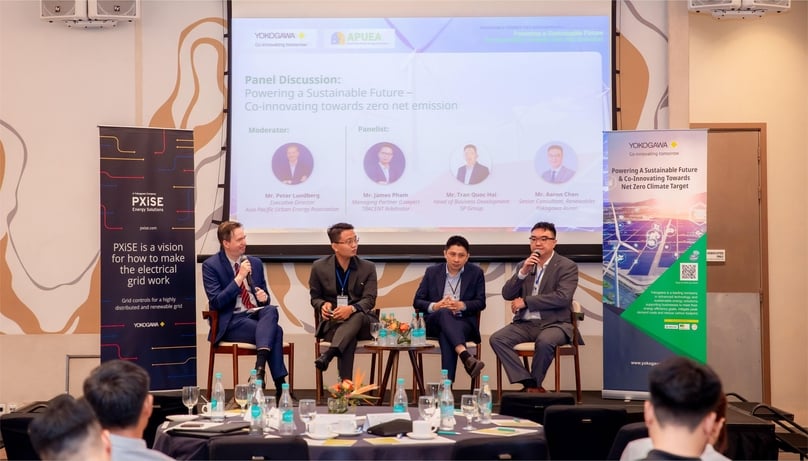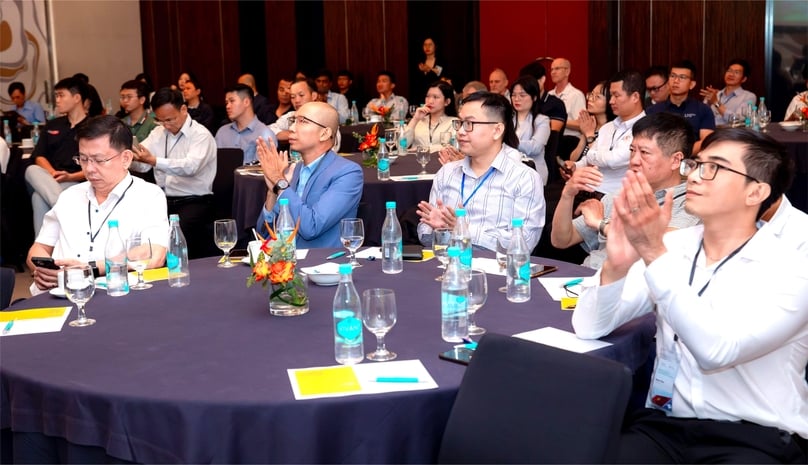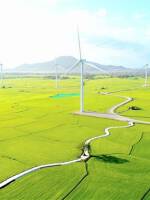
In the context that Vietnam is facing major challenges from climate change and increasing demand for electricity, the seminar “Renewable Energy Transition in Vietnam: Policy, Technology and Solutions” held on April 25 gained special attention from experts, businesses and policy makers.
The event, organized by the Asia-Pacific Urban Energy Association (APUEA) in collaboration with Yokogawa Vietnam, took place with the participation of speakers from many international organizations and leading technology enterprises.
It focused on discussing strategic directions, latest policy updates from the country’s Power Development Plan VIII (PDP8), the potential for renewable energy development, as well as technological solutions to support Vietnam in realizing its commitment to achieving net zero emissions by 2050.
Renewable energy: Great opportunities, big challenges
In the opening speech, Hagiwara Etsushi, managing director of Yokogawa Vietnam, emphasized the pivotal role of renewable energy in Vietnam’s sustainable development.
“Vietnam currently has a renewable energy potential 15 times greater than its current capacity, but its electricity supply is still heavily dependent on coal-fired thermal power and hydropower – two sources that are strongly affected by climate change. We need to rapidly transition to cleaner and more sustainable solutions,” he said.
Hagiwara Etsushi noted that to take advantages of opportunities in the renewable energy sector, one of the key strategies is to reduce the dependence on traditional resources and develop technological infrastructure.
“Vietnam’s policies should focus on solar power, wind energy, and especially the development of energy storage systems, as well as optimizing biomass energy and energy from waste. These factors are truly crucial in the transition to clean and sustainable energy,” he added.
According to Peter Lundberg, executive director of the Asia Pacific Urban Energy Association (APUEA), Vietnam aims to increase the proportion of renewable energy to 32.3% by 2030 and 65-70% by 2045.
However, Lundberg stressed that this process will not be easy without clear policies and appropriate technological solutions to address issues related to economic efficiency and operations.
James Pham, managing partner (lawyer) of Tracent Arbitrator, shared the new highlights in PDP8 and assessed its impacts on Vietnam’s electricity market.
According to James Pham, PDP8 not only emphasizes the development of renewable energy but also promotes the direct power purchase agreement (DPPA) model, encouraging private sector involvement in investing and developing clean energy infrastructure.
“The government has shown very positive signs in expanding investment opportunities in renewable energy. However, to fully leverage these mechanisms, businesses need a clear understanding of the legal framework and thorough preparation in their investment strategies,” he noted.

Technology connectivity initiative: Smart IoT and future collaboration
As one of the leading corporations in automation and digital transformation, Yokogawa brought a comprehensive suite of solutions for the renewable energy sector to the conference.
Aaron Chen, a senior consultant at Yokogawa ASEAN, presented two key topics: “Yokogawa’s Comprehensive Solutions for Renewable Energy” and “Efficient Asset and Energy Management.”
According to Aaron Chen, the application of industrial data platforms (IIoT), smart sensors, and artificial intelligence can help optimize operational performance, reduce losses, and enhance the reliability of wind and solar power systems. “Digital transformation is the key to turning net-zero goals into reality,” he emphasized.
Quang Tran, Yokogawa ODC Vietnam manager, shared experiences in implementing digitalization and decarbonization solutions for eco-industrial parks, helping businesses reduce emissions and improve energy efficiency, while managing environmental indicators, wastewater, and solid waste.
Meanwhile, Le Dac Vinh, product sales manager of Yokogawa Vietnam, introduced smart IoT systems for wind and hydroelectric energy. These technologies enable remote monitoring, real-time supervision, and predictive maintenance, thereby extending operational lifespans and optimizing costs.
Another outstanding solution is Pxise Energy, a Yokogawa-developed technology that integrates AI to help utilities and grid operators effectively manage unstable renewable energy sources and distributed energy systems, ensuring safe, continuous, and reliable power supply.
The final panel discussion provided practical perspectives on collaboration opportunities among stakeholders – from the public and private sectors to international organizations – in the journey toward net-zero emissions.
The speakers agreed that achieving the net-zero target requires a combination of flexible policies, advanced technologies, and strong engagement from the business community.
With the involvement of organizations like APUEA, the support of companies like Yokogawa, and national policies such as PDP8, Vietnam is on the right track toward transitioning to a clean, sustainable, and more equitable energy ecosystem for future generations.
“Yokogawa has a positive outlook on Vietnam’s energy market and is committed to supporting the country’s energy transition through various initiatives and technologies. We focus on integrating AI solutions, smart grids, and energy management to improve the efficiency and profitability of Vietnam’s energy market,” said Hagiwara Etsushi, managing director of Yokogawa Vietnam.
Thai Ha





